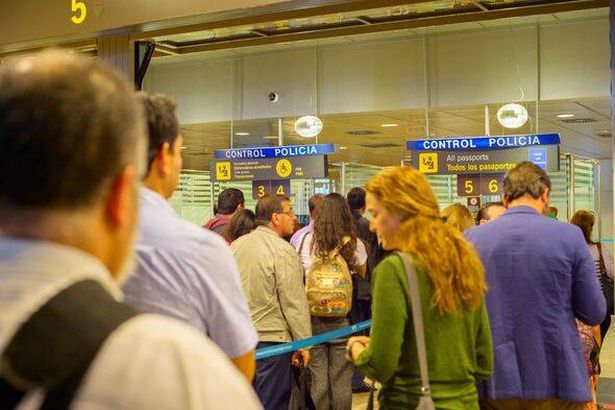Travellers will be met with a new rule once touching down in many European nations from next month
Courtney Eales and Liam Ryder Digital Production Editor
13:21, 25 Sep 2025
 British tourists heading to places like Malaga are warned of new travel disruption(Image: Holger Leue/Getty Images)
British tourists heading to places like Malaga are warned of new travel disruption(Image: Holger Leue/Getty Images)
Holidaymakers heading abroad face the risk of travel disruption over a new rule coming into effect in weeks. Those jetting off to EU nations such as Spain for some winter sun may encounter longer queues at the airport when they land due to new EU regulations.
Anyone planning a trip other popular holiday spots like France, Italy, Croatia, Switzerland and Portugal should also brace themselves for extended queues upon landing in Europe. This is a result of new EU rules requiring visitors to provide details under the forthcoming Entry/Exit system (EES). Officials have cautioned that delays may occur as each passenger will need to use this new system.
Travellers flying to these countries will notice significant changes at the airport. Upon entering and exiting the Schengen area, which includes Spain, you’ll be required to provide fingerprints and a photo, and answer Schengen Border Code questions, according to the Liverpool Echo.
Foreign Office officials predict that using the new system – which becomes operational on October 12 – will add a few minutes to each passenger’s time at the airport. However, they emphasise that there’s no need to take any action before arriving at the border, and there are no costs associated with EES registration.
‘Be prepared’ Trips to Benidorm, one of UK tourists’ favourite Spanish destinations, may take longer once you land(Image: JESUSDEFUENSANTA via Getty Images)
Trips to Benidorm, one of UK tourists’ favourite Spanish destinations, may take longer once you land(Image: JESUSDEFUENSANTA via Getty Images)
The Foreign Office guidance states: “If you are travelling to a country in the Schengen area for a short stay using a UK passport, you will be required to register your biometric details, such as fingerprints and a photo, when you arrive. After it is fully implemented, EES registration will replace the current system of manually stamping passports when visitors arrive in the EU.
“EES may take each passenger a few extra minutes to complete so be prepared to wait longer than usual at the border once the system starts. When EES is introduced, you may need to create a digital record on your first visit to the Schengen area at the port or airport on arrival.
“You will need to submit your fingerprints and have your photo taken at dedicated booths. You will not need to provide any information before travelling to a Schengen area country.
“If you are flying to a country in the Schengen area, you will complete EES checks when you arrive at your destination. The checks may take a few minutes, so be prepared to wait during busy times.”
 Officials anticipate longer queues at passport control(Image: Getty)
Officials anticipate longer queues at passport control(Image: Getty)
Additional Schengen zone requirements specify that your passport must display a ‘date of issue’ within ten years of your arrival date. Should you have renewed your passport prior to 1 October 2018, it could carry an issue date exceeding the 10-year limit.
Your passport must have an ‘expiry date’ at least three months beyond the day you plan to leave the Schengen area (the expiry date does not need to be within 10 years of the date of issue). The Foreign Office has advised that before setting off, travellers should ensure their passports and other travel documents meet the necessary requirements.
Failure to present a valid travel document or attempting to use a passport reported as lost or stolen will result in denied entry. Visa-free travel to the Schengen area, which includes Spain, is permitted for up to 90 days within any 180-day period.
This applies under certain conditions:
- as a tourist
- to visit family or friends
- to attend business meetings, cultural or sports events
- for short-term studies or training
Upon arrival at Spanish border control, you may be required to present:
- a return or onward ticket
- proof of your travel insurance
- you have enough money for your stay – the amount varies depending on your accommodation
- a hotel booking confirmation or proof of address if you’re staying at your own property
- an invitation or proof of address if staying with a third party, friends or family, such as a ‘carta de invitation’ completed by your hosts
Schengen countries affected by new EU Entry/Exit System Ensure your passport adheres to the regulations if you’re travelling to one of the below countries(Image: Artit_Wongpradu via Getty Images)
Ensure your passport adheres to the regulations if you’re travelling to one of the below countries(Image: Artit_Wongpradu via Getty Images)
- Austria
- Belgium
- Bulgaria
- Croatia
- Czech Republic
- Denmark
- Estonia
- Finland
- France
- Germany
- Greece
- Hungary
- Iceland
- Italy
- Latvia
- Liechtenstein
- Lithuania
- Luxembourg
- Malta
- Netherlands
- Norway
- Poland
- Portugal
- Romania
- Slovakia
- Slovenia
- Spain
- Sweden
- Switzerland
